The 40 Best Foods for Lowering Your Cholesterol, According to a Nutritionist
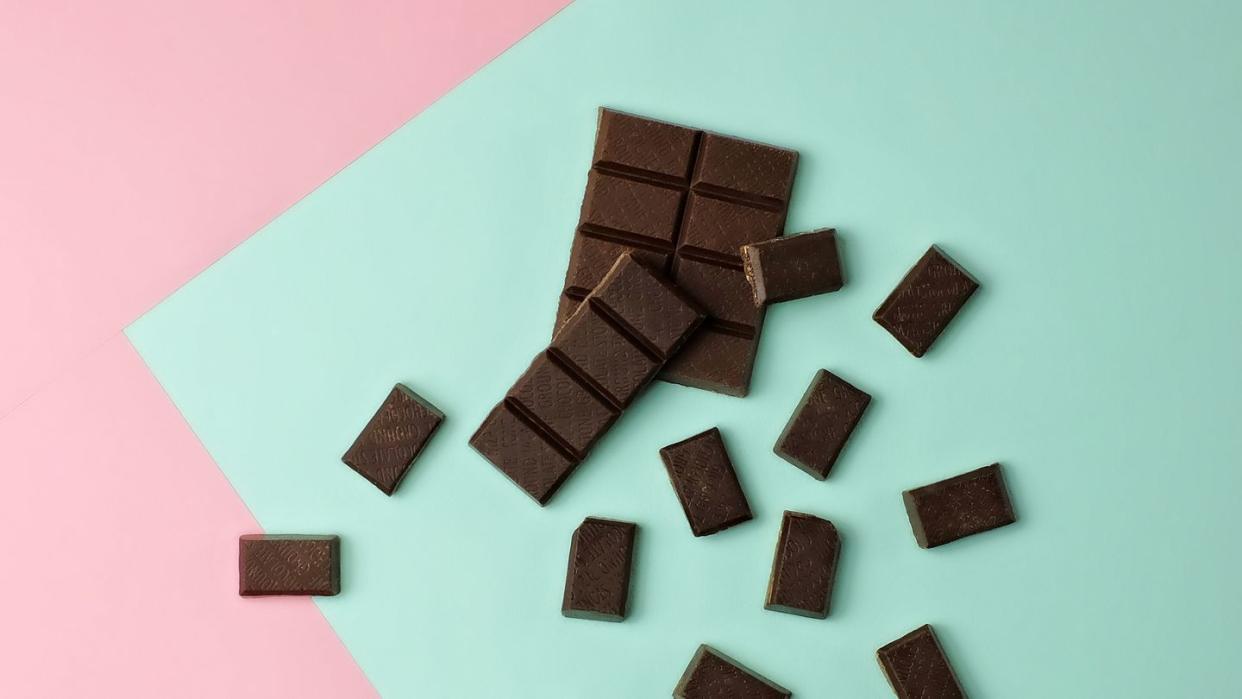
Being told that you have elevated cholesterol can feel like a letdown on an otherwise good bill of health. But you aren’t alone—according to the Centers for Disease Control and Prevention (CDC), nearly one in three Americans is plagued with high cholesterol, a significant risk factor for developing heart disease.
Cholesterol is a waxy substance that travels through your bloodstream that comes from two sources: your liver and your diet. Your liver makes all the cholesterol your body needs to build cells, hormones, and other elements; the remainder comes from food. As the amount of cholesterol increases, so does the risk to your health.
There are two kinds of cholesterol. LDL, the “bad” kind, contributes to fatty buildup in your arteries and heart, putting you at risk for heart attacks, while HDL carries the LDL away from your arteries and back to the liver where it is broken up and excreted. But HDL can only do so much of the work, and only about a third of all the LDL is eliminated by HDL.
This is where you come in, because like they say, you are what you eat. A diet high in cholesterol can increase your risk of stroke. But because it presents no signs or symptoms beforehand is is why strokes can feel so sudden and unexplained. How can you get ahead of the curve? Believe it or not, it’s all about adding more foods that are rich in good sources of cholesterol while also eating foods to reduce the bad can help lower your levels.
This means you’re simultaneously cutting back on high-LDL items such as fried food, fast food, desserts, and processed meats (bacon, hot dogs, etc.), while adding more veggies, fruits, nuts, seeds, fish, and whole grains. This can help lower your cholesterol levels and reduce arterial plaque buildup. So give your body some love with these heart-friendly foods.
Dark Chocolate
Dark chocolate contains more cocoa than milk chocolate, and the higher the cocoa content, the more bioactive compounds you get. Elements such as flavonoids and antioxidants improve blood flow and reduce blood pressure, and according to a study published in The American Journal of Clinical Nutrition, those who took cocoa supplements were 27% less likely to die of cardiovascular disease. Choose a product that is at least 75% cocoa, says Stefani Sassos, MS, RD, nutrition director at the Good Housekeeping Institute.

Strawberries
This naturally sweet treat is also good for your heart. Research from San Diego State University found that those who ate strawberries every day had reduced blood pressure and improved their cardiovascular risk factors. Another study published in the journal Nutrients found that eating strawberries improved blood lipid profiles and lowered LDL cholesterol.
RELATED: 20 Lightened Strawberry Desserts for Summer

Okra
Cut open an okra and out will ooze mucilage, a clear “goo” that contains exopolysaccharides (EPS), compounds that are known to reduce cholesterol and blood pressure. A recent study found that EPS may positively alter your gut microbiome, helping prevent lifestyle-related health conditions and cardiovascular disease.
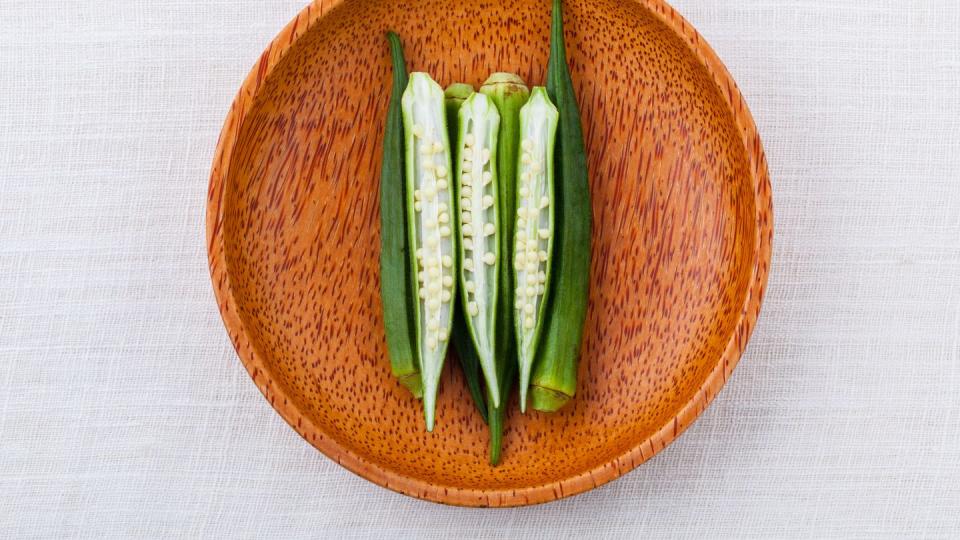
Potatoes
Did you know that a baked potato provides more heart-healthy potassium than a banana? A medium-ish baked potato with skin that weighs about 100 grams contains 573 milligrams of potassium while the same amount of bananas only has 358 milligrams. Why does that matter? The mineral helps regulate blood pressure. To maximize the fiber content, eat the peel as well as the flesh: one baked potato with skin has a total of 14 grams of fiber—6 grams more than without one.
RELATED: 15 Potassium Superfoods That Aren't Bananas

Tomatoes
Not only do tomatoes contain heart-healthy potassium, they also contain lycopene—a compound that acts as a cardio-protective and anti-inflammatory to improve blood flow while reducing blood pressure. Lycopene also binds to LDL cholesterol, which may help protect against atherosclerosis (hardening of the arteries) by suppressing the lipid from damaging blood vessels.
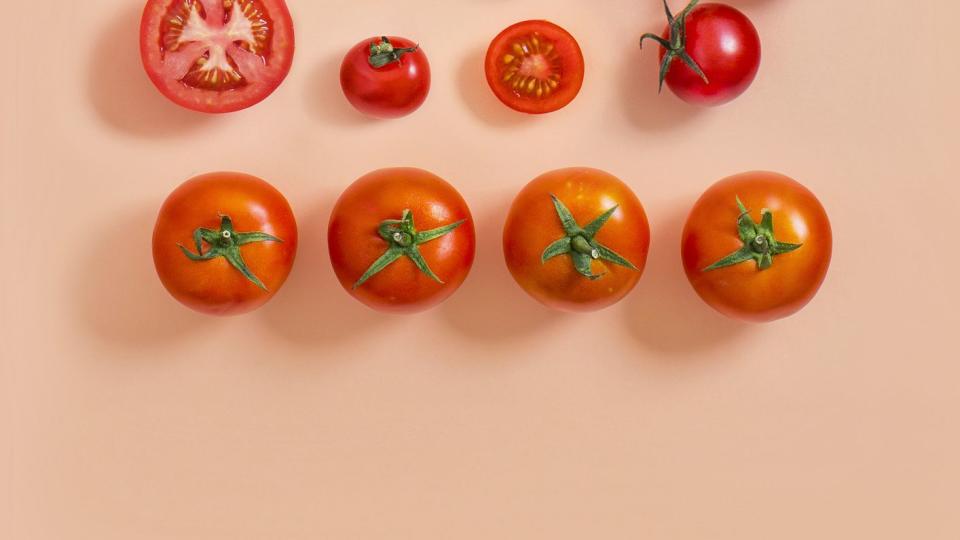
Tuna
Whether you prefer fresh or canned, one thing is true: Tuna is a heart-healthy superstar. Fatty fish such as tuna contain lots of omega-3s, fatty acids, which the American Heart Association recommends to help reduce inflammation, lower blood pressure and triglycerides, and reduce your risk for heart disease. Aim for at least two servings per week (about 6 ounces cooked).
RELATED: The Best Canned Tuna to Make Your Favorite Sandwiches and Salads
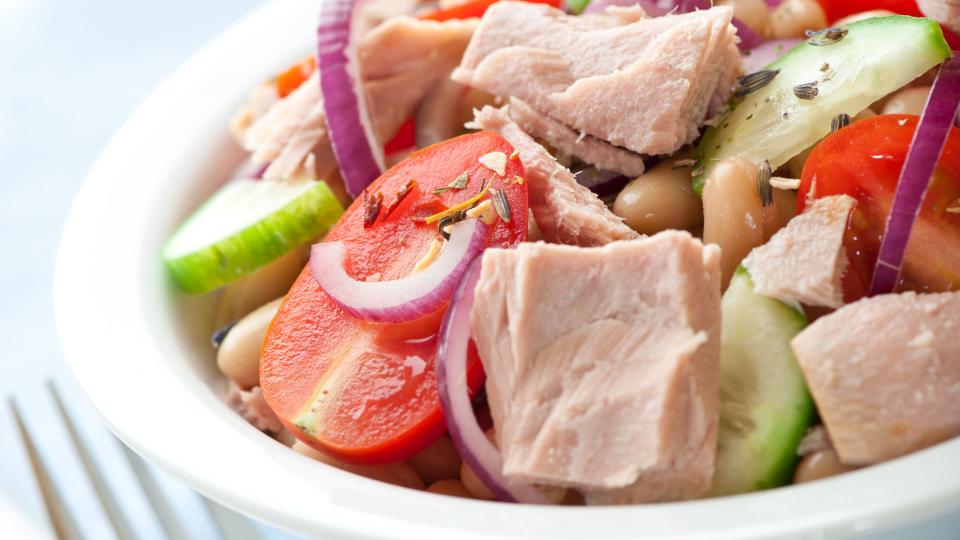
Raspberries
With 8 grams of fiber per cup, raspberries help support digestion and decrease LDL: A study published in Nutrients found that soluble fiber (as is found in raspberries) may help decrease the absorption of cholesterol in the large intestine, and can help reduce blood pressure.
RELATED: 9 Low-Sugar Fruits You Should Stock Up On

Black Beans
Black beans are more than just a great plant-based source of protein. They contain several phytochemicals such as saponins, anthocyanins, and flavonols that have been found to reduce serum cholesterol levels.
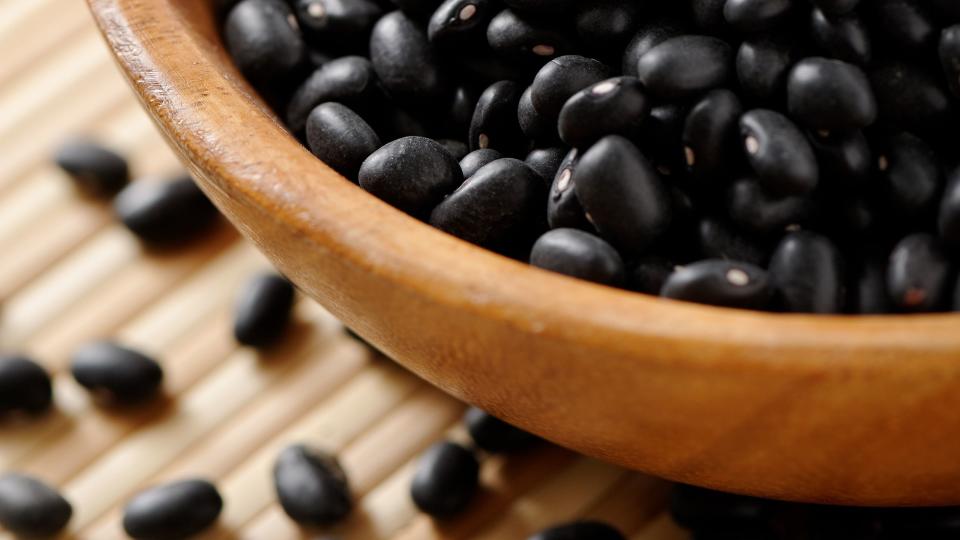
Kale
A number of phytochemicals make kale a nutritional superstar. Its collection of nutritional compounds help protect against cardiovascular diseases, induce a vasodilatory effect (i.e., they cause your blood vessels to dilate, reducing blood pressure), and reduce triglycerides and cholesterol, as well as body weight and fat mass.
RELATED: 30+ Quick and Easy Kale Recipes

Apples
As it turns out, two apples a day could keep the cardiologist away. According to preliminary research published in the American Journal of Clinical Nutrition, 50 women who ate two whole apples daily reduced their serum levels of LDL and triglycerides.
RELATED: The 70 Greatest Things You Can Do With Apples

Pecans
Got high cholesterol? Have a handful of pecans. After an eight-week trial, adults at-risk for cardiovascular disease who ate pecans every day demonstrated a reduction—between 6% and 9% —in LDL cholesterol, as well as triglyceride levels. Researchers concluded that the healthy fatty acids and fiber in the nuts were likely responsible for these results.
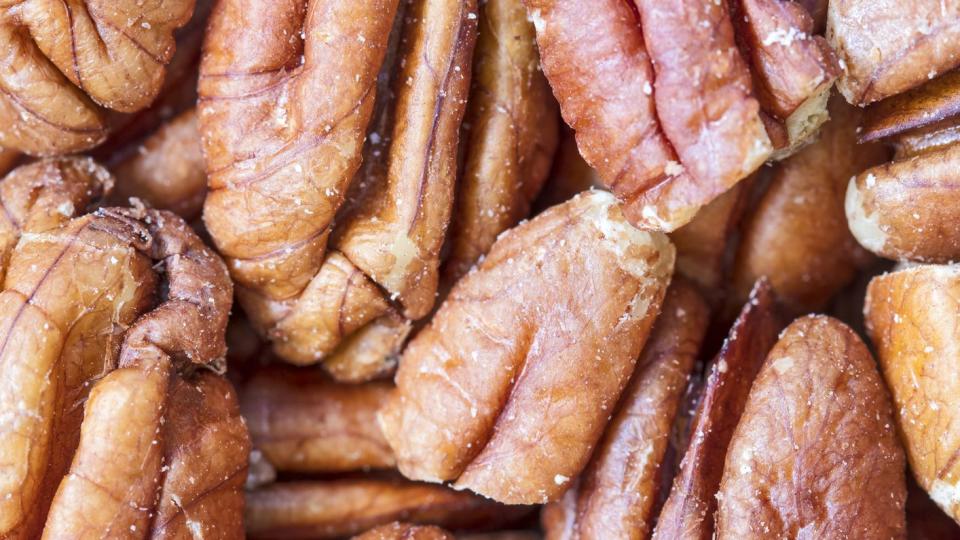
Sweet Potatoes and Butternut Squash
These two veggies share a common heart-healthy compound: beta-carotene. A study published in the Journal of Nutrition found that beta-carotene was associated with reductions in circulating plasma cholesterol—one of the strongest risk factors for cardiovascular disease. Sweet potatoes and squash also have plenty of potassium, a mineral that can help regulate blood pressure.
RELATED: How to Buy and Bake Perfect Sweet Potatoes
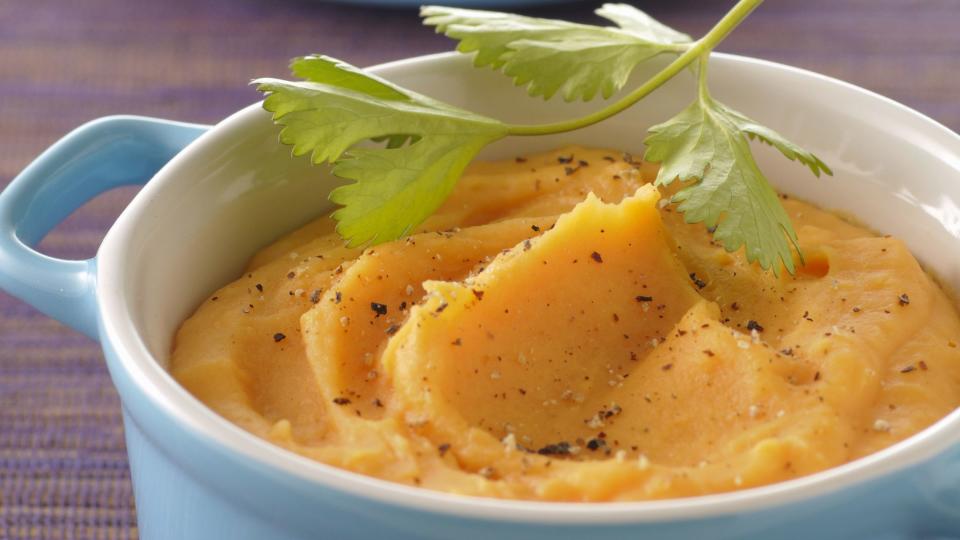
Oats
A daily dose of oats may lower your cholesterol levels. Oats contain a fiber called beta-glucan, which has been shown to significantly decrease LDL. Another study published in Current Nutrition Reports found that the fiber and nutrients in oats can curb appetite and help prevent obesity, one of the highest risk factors for cardiovascular disease.

Lentils
Lentils are packed with plant-based protein, fiber, and antioxidants. It’s these bioactive compounds and antioxidants that are the keys to lentils ability to help reduce blood pressure, LDL cholesterol, and the risk of chronic cardiovascular disease. Just one cup of cooked lentils contains more than 15 grams of fiber, 18 grams of protein, and 731 milligrams of heart-friendly potassium.
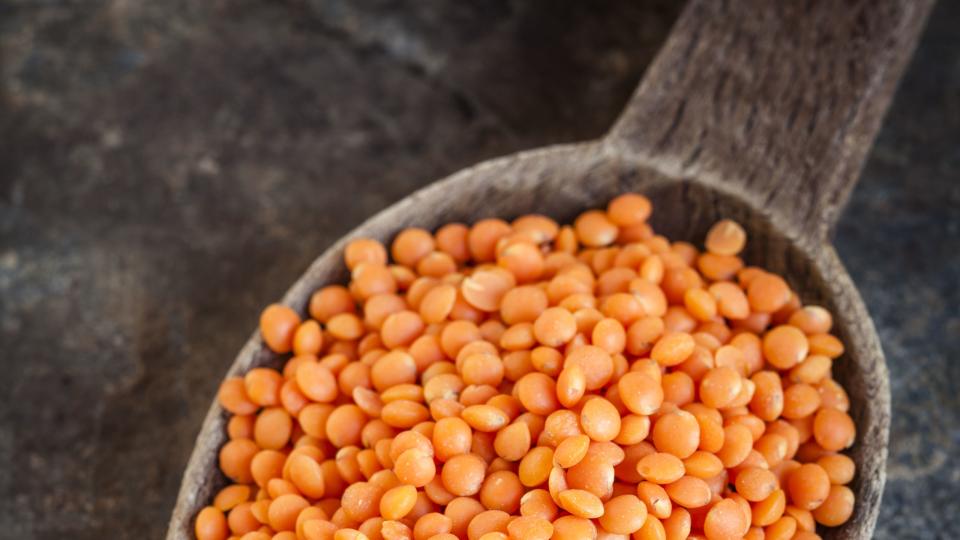
Walnuts
Eating walnuts regularly was linked with a reduced risk of heart disease, according to data from the Nurses' Health Study. Eating as little as one serving of these nuts each week can lower your chances of cardiovascular disease by up to 19%! Consider swapping walnuts for croutons in salads and soups; add ‘em to breakfast cereal or yogurt; or nosh on walnuts with fruit to reap the cholesterol-lowering benefits.

Avocado Oil
Extracted from the pulp of the avocado fruit, avocado oil has many of the same benefits, including monounsaturated fats, which the American Heart Association recommends replacing saturated and trans fats with to reduce cholesterol and slash your risk for heart disease and stroke.
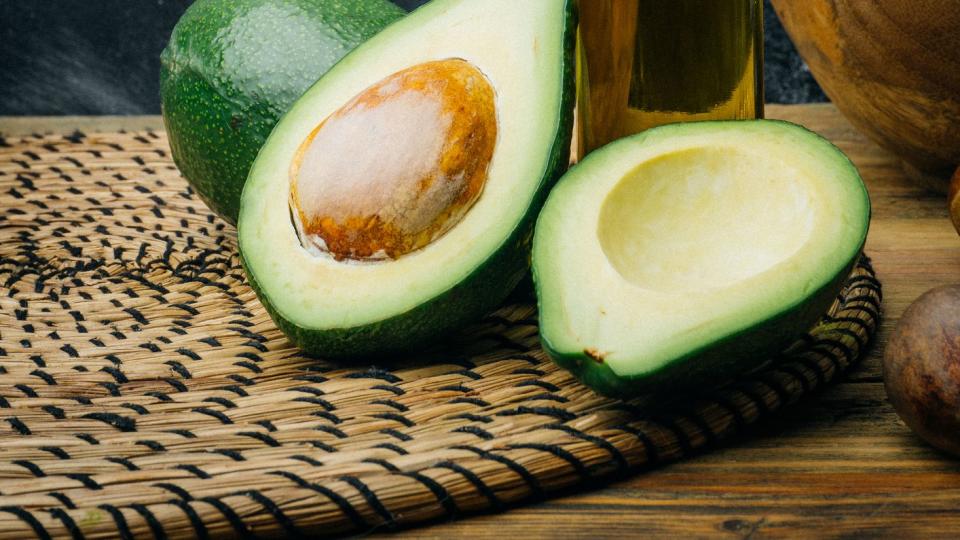
Flaxseeds
These tiny seeds pack a big nutritional punch. They are high in heart-healthy fiber and omega-3 fatty acids, as well as lignans, which were associated with a lower risk of cardiovascular disease in a meta-analysis of 12 studies. Another 12-week study found that flaxseeds were effective in reducing blood pressure, total cholesterol and body mass index.
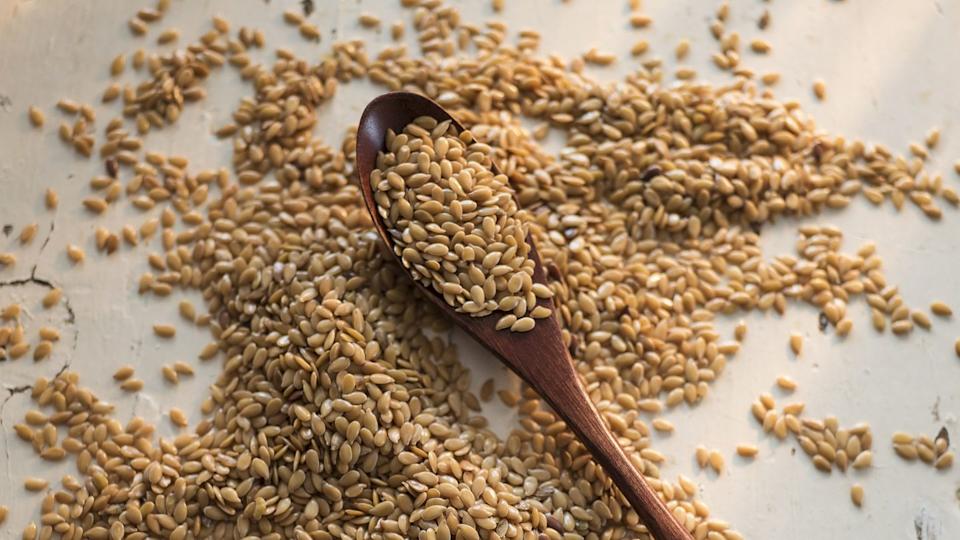
Herbs and Spices
Flavoring foods with natural herbs and spices instead of sodium and oil can minimize caloric intake and blood pressure, and improve your antioxidant profile. Some spicy superstars include turmeric, which has been shown to reduce LDL cholesterol; ginger which may reduce blood pressure; and black pepper, which contains piperine, a compound reported to improve your blood lipid profile and prevent arterial stenosis.
RELATED: 10 Herbs You Can Grow Indoors Year-Round

Avocado
Because they’re rich in unsaturated fats and fiber, eating just one avocados per week can help reduce your risk of CVD and stroke, according to the Journal of the American Heart Association. So go ahead and enjoy that avocado toast!
RELATED: 20+ Amazing Avocado Recipes

Blueberries
Blueberries contain polyphenols, nutrients that were shown to improve vascular function and reduce blood pressure in a study published in the American Journal of Clinical Nutrition. They also contain anthocyanins, which are associated with a reduced risk of cardiovascular disease and type 2 diabetes.
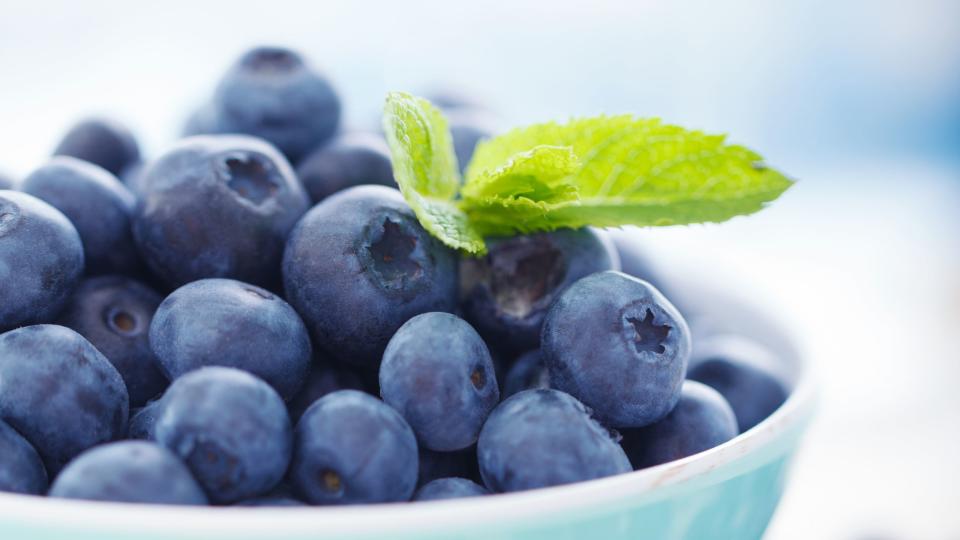
Quinoa
Cook up some quinoa and improve your health. The phenolic compounds and saponins in quinoa may help reduce the risk of cardiovascular disease and diabetes, and its soluble fiber helps decrease triglycerides and LDL levels in the body while increasing healthy HDL levels, according to Food Reviews International.

Salmon
This fatty fish is one of nature’s best sources of omega-3s. A 2023 study published in the Journal of the American Heart Association found that consuming 2 grams of EPA and DHA—the two kinds of omega-3s found in salmon—may lower triglycerides and remove harmful cholesterol molecules from the body. The American Heart Association recommends eating at least two servings (a total of 6 ounces, cooked) of fatty fish like salmon per week.
RELATED: 16 Salmon Dinners That Are Super Healthy

Spinach
Dark green vegetables such as spinach are a great source of vitamin K, which promotes blood clotting and reduces the risk of cardiovascular disease, according to a study published in the Journal of the American Heart Association. One cup of spinach also provides 24 milligrams of magnesium, a nutrient that is essential for maintaining blood pressure.
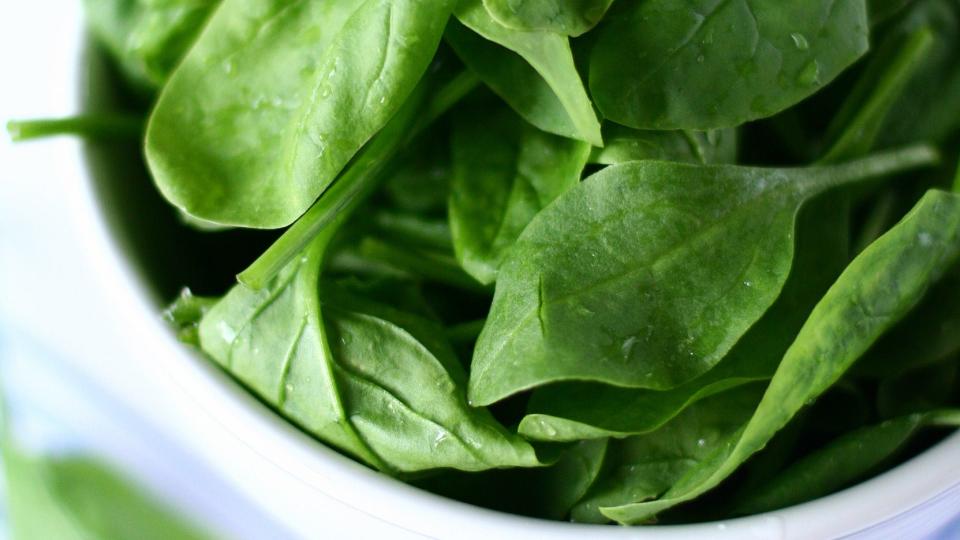
Peanut Butter
This frequent jelly companion is packed with resveratrol and other phytosterols that are good for your body: a study found that eating a single serving of peanuts or peanut butter daily led to changes in the gut microbiota that ultimately improved vascular biomarkers and overall heart health.
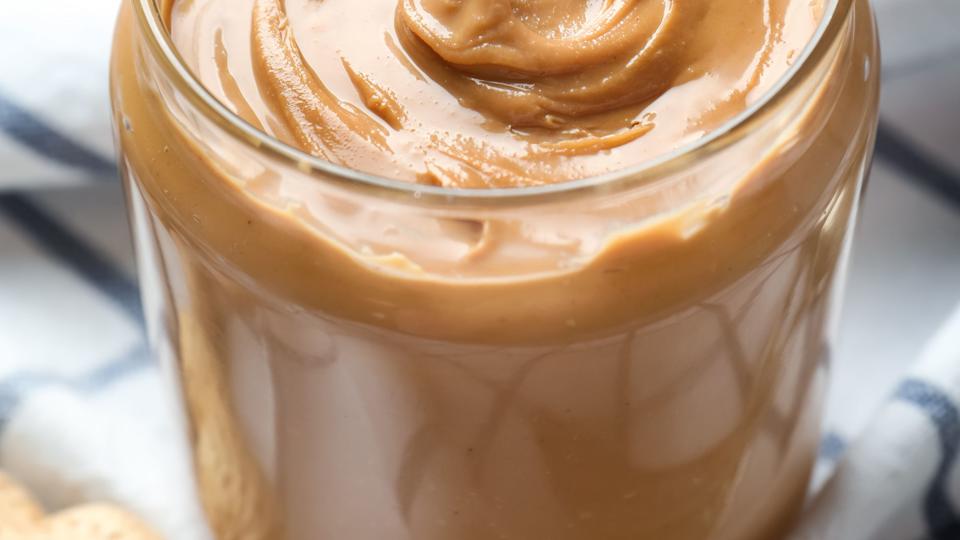
Almonds
Almonds contain lots of healthy unsaturated fats, and a study published in The Journal of Clinical Nutrition found that snacking on almonds for six weeks reduced total LDL cholesterol. One ounce of almonds also contains 80 milligrams of magnesium, a mineral that plays a role in your heartbeat rhythm, and a study published in Nutrients found that serum magnesium is inversely associated with the risk of atrial fibrillation and coronary artery disease.

Olives and Olive Oil
Olives and olive oil have long been touted for their health benefits, and as part of the Mediterranean Diet, they play a large role in reducing your risk of cardiovascular disease. However, research indicates that extra-virgin olive oil (EVOO) might be the ultimate key to longevity: EVOO may positively affect fat metabolism, optimizing circulating cholesterol and triglyceride levels.

Grapes
Like other produce, grapes contain polyphenolic compounds that may reduce cellular damage. Eating about 1 to 2 cups of grapes per day can also help protect your tissues and decrease markers of inflammation.

Eggplant
This nightshade fruit (yes, it’s a fruit!) is low in calories, high in fiber, and replete with nutrients such as vitamins C, K, B6, folate, and potassium. Like blueberries, purple eggplants also have a high level of anthocyanins in the skin, compounds which have been shown to reduce LDL cholesterol.
RELATED: 20+ Dishes That Will Make You Fall in Love with Eggplant
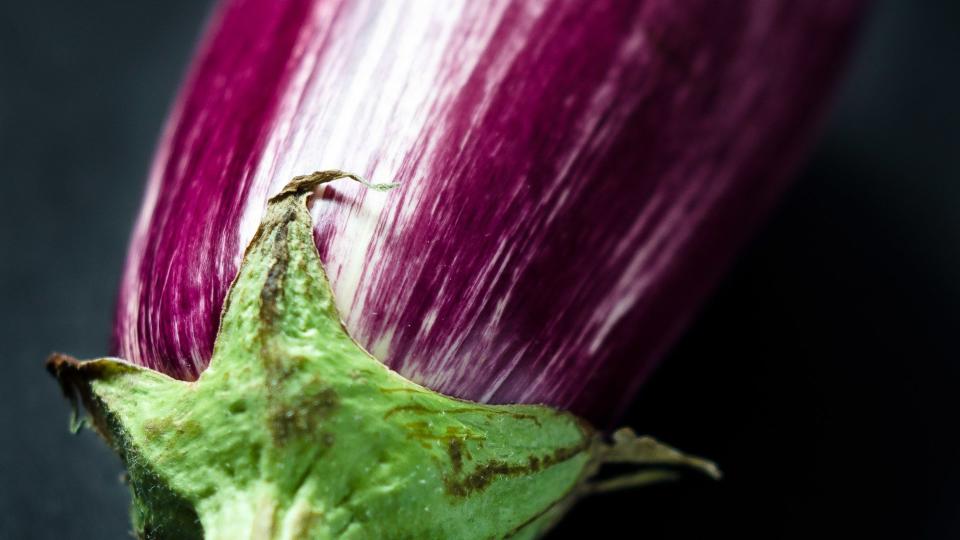
Unsweetened Soy Milk
This protein-packed dairy alternative contains lots of antioxidants and minerals, and because it is lower in fat than many other milks, it can help improve your lipid levels. A half-cup of soy milk contains 118 milligrams of potassium, which is associated with reduced blood pressure. Unsweetened versions cut back on sneaky sources of added sugar, so use it in your morning latté for a cholesterol-lowering caffeine boost.

Corn Oil
This overlooked cooking oil belongs in your pantry because it contains plant-sterols, compounds that decrease how much cholesterol-raising saturated fat your body absorbs. Plus, it’s packed with antioxidants like other plant-based oils: canola, olive, grapeseed, peanut, safflower, sunflower, and avocado.
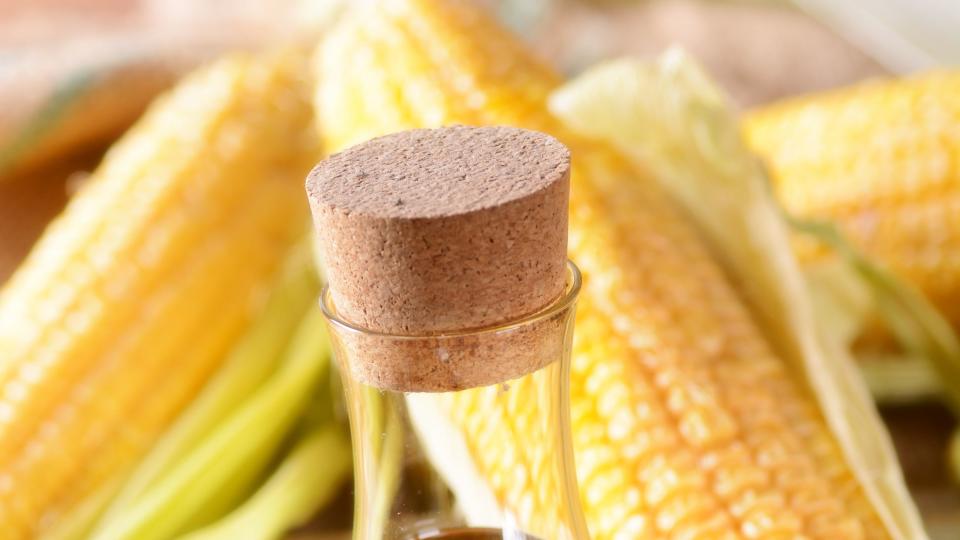
Pistachios
Like most nuts, pistachios are rich in protein and healthy fats, but they are the only tree nut that contains resveratrol. A 2021 study found that resveratrol reduced LDL, triglycerides, and free fatty acids, while simultaneously increasing the HDL. And a systematic review and meta-analysis of studies on pistachios revealed that consuming pistachios reduced total cholesterol, LDL cholesterol and protects against cardiovascular disease.

Hummus
Hummus typically contains chickpeas, tahini, garlic, and olive oil—dietary ingredients that have all been linked to a reduction in cholesterol. Chickpeas, for instance, contain lots of healthy fatty acids, including ALA and EPA, which have been proven to be effective anti-hypertensives (helping reduce blood pressure).
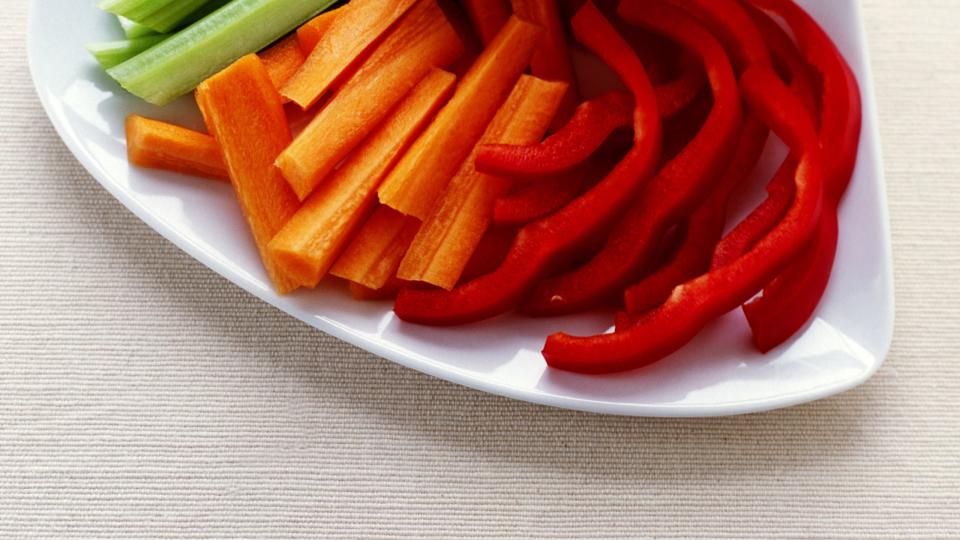
Buckwheat and Barley
These “B-grains” might not be on your radar—but they should be. Buckwheat is a highly functional food that contains a spectrum of flavonoids. One in particular, rutin, helps prevent blood vessels from hardening and improves circulation. A 2023 study found that barley is high in beta-glucans, a kind of soluble fiber that can help decrease cholesterol.

Cherries
Believe it or not, there are about a hundred types of cherries on the planet, and they are grouped into two categories: sweet or tart. Both kinds offer a host of benefits: Recent research found that eating tart cherries significantly reduced inflammation—one of the risk factors for chronic diseases such as heart disease. And the Journal of Functional Foods reported that the nutritive compounds such as anthocyanins in sweet cherries can help reduce oxidative stress, one of the main processes underlying disease.
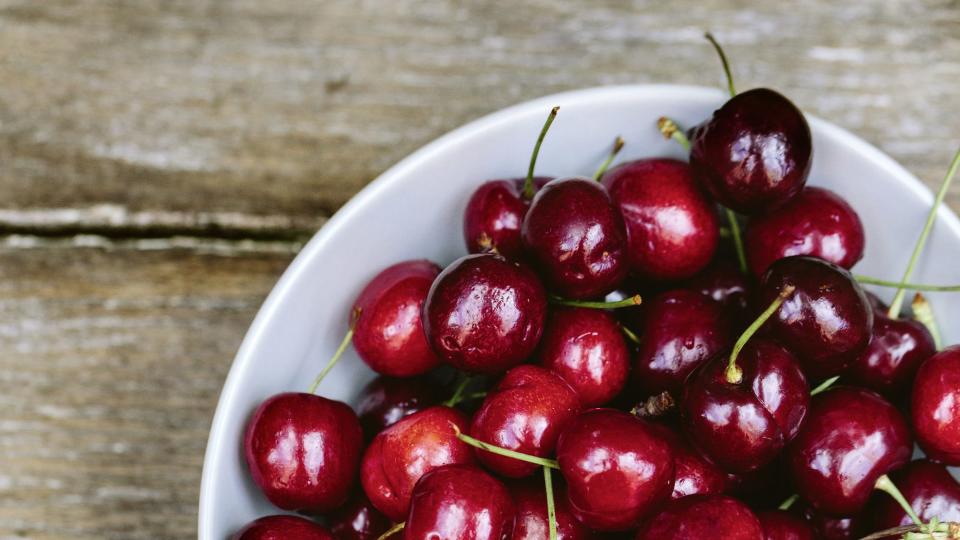
Edamame
Edamame beans contain soy, a powerhouse plant-based protein that has been shown to reduce LDL, and lower your risk for cardiovascular disease, according to research published in the journal Antioxidants. And because edamame is also full of fiber, it helps curb cravings, too.
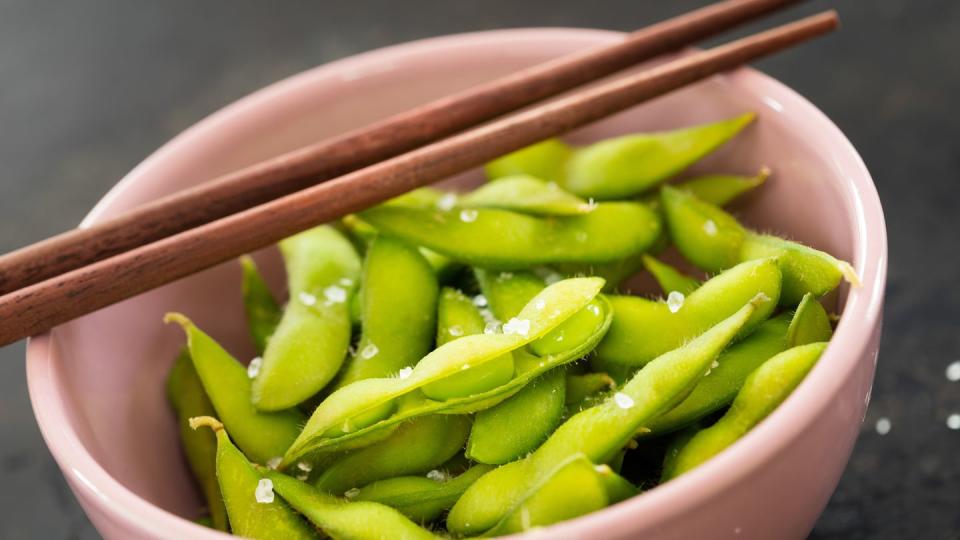
Pumpkin
This fall staple is known for its high levels of beta-carotene, the powerful antioxidant that gives pumpkin its orange color. It’s also rich in fiber, potassium, and vitamin C—all of which have been linked to heart-health benefits. Pumpkin is also low in calories (it is 94% water!), so use a scoop of cooked pumpkin in soups, smoothies, and even pancakes!

Chia Seeds
Tiny chia seeds contain a wealth of omega-3 fatty acids, polyphenols, vitamins, and minerals, all of which have been shown to decrease your triglycerides and control LDL (bad) cholesterol. And according to a study published in Food Science & Nutrition, they also contain an antioxidant called quercetin, which has been shown to reduce the danger of heart disease.

Bananas
Bananas lower cholesterol by removing it from your digestive system, preventing it from moving into your bloodstream and clogging your arteries. For an extra heart-healthy boost, slice bananas on top of morning oats with a tablespoon of chia seeds.
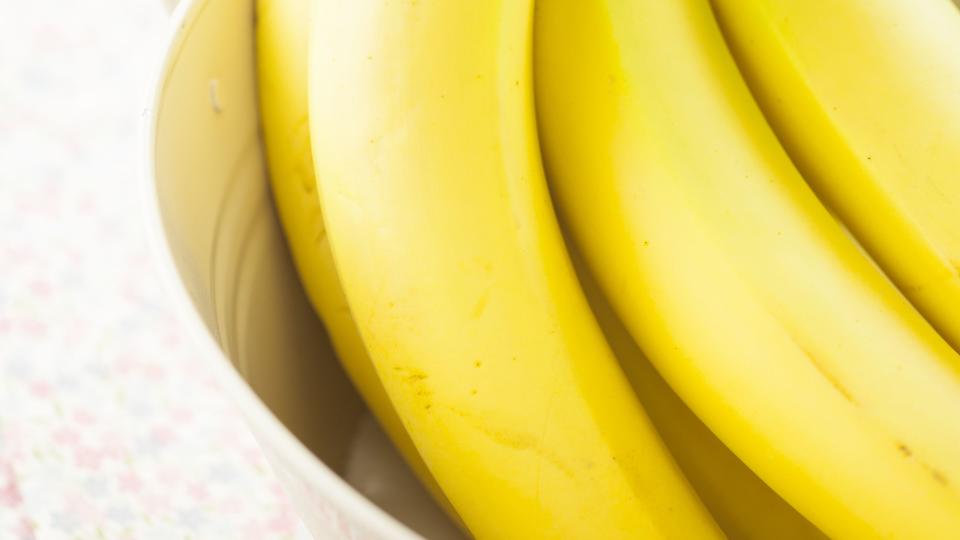
Sardines
You should consume 8 to 12 ounces of seafood each week for optimal health, and canned sardines are an easy way to get in your fish-food. Sardines contain a glut of omega-3s for a healthy heart, and because they’re so small, they have less mercury than other fatty fish, and because you eat them whole, you also get the benefit of additional calcium, a heart-healthy nutrient.

Sesame Oil
This lesser-known monounsaturated oil has a nutty flavor that’s perfect for stir fries. Recent research published in Frontiers in Nutrition found that its high level of antioxidants, unsaturated fatty acids, and lignans help decrease LDL and increase HDL, and can improve overall health.

You Might Also Like
